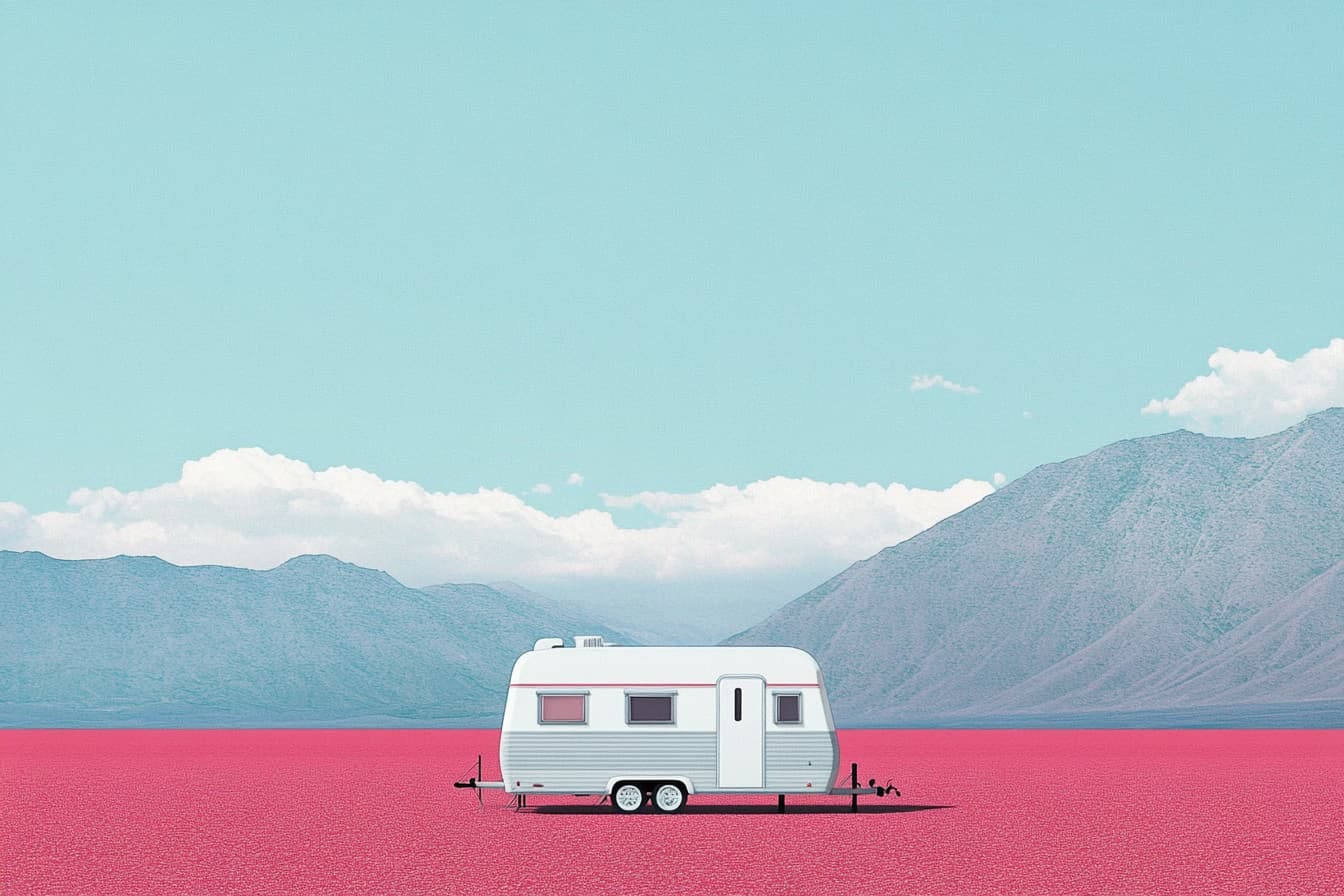This week’s Perspectives is an interview with Katherine Pomfret. Katherine quit corporate life a year ago and now runs The Society of Alternative Entrepreneurs. She also works as a waitress in the U.K.
Katherine wrote about why she was quitting corporate life in a LinkedIn post that went viral. Her story caught my attention and I’ve been following her journey ever since. Katherine and I chatted about her life now, and why she’s so passionate about alternative entrepreneurialism.
Anna Burgess Yang: I want to set the stage a bit. Tell me what you are doing for work now, after you quit your job last year.
Katherine Pomfret: I live in a caravan now, with a cat. I rent a little piece of land that my van is on. I do not have a toilet or a shower in my van. I do now have gas. For a while, I didn't have electricity, gas, or water.
For income, I do three things. My passion project is my jewelry making. I make silver jewelry in my caravan. I have some income from The Society of Alternative Entrepreneurs. And I work as a waitress, more than full time. Up to 50 hours a week on minimum wage. I love waitressing. I love making people's days that little bit better. You can put the food down with care. You can present a burger in a million different ways. There is an art to it. And how you do it will affect someone's whole mood, and how they react to every other human being for the rest of the afternoon.
We encourage multiple income streams in alternative entrepreneurialism. Why? Because no job can possibly allow you to give all talents that you have to the world. And no job can adequately fulfill all your needs. So it makes sense to do different things.
It's also in the way the world is going. In the volatile and unpredictable nature of the global political climate, it makes sense to have options. And not to put all your eggs in one basket, which, of course, the corporate world has encouraged us to do. Because they want all of us. They're greedy. They do not want us to have an ounce of energy left after they've squeezed us dry. So they encourage that mindset. But multiple income streams are also really good if you have passions that you want to follow.
ABY: Tell me about quitting your corporate job.
KP: People love the phrase "the great leap." It wasn't. I quit seven jobs in three years. I kept thinking the boss was wrong, or the company culture was wrong, or the setup with the investors was wrong. Or mostly, I thought I was wrong. I thought, all the time, "What is wrong with me?" I quit a job in March 2023, and then I did my usual, applying for jobs. I always got jobs really easily, probably because I was so good at faking it.
I was going through this recruitment process for a job that was going to be even more money, bigger team, blah blah. And they treated me appallingly during the interview process. They asked me, "So, we've told you your budget. But what are you going to do if three months into the year, we cut your budget by 70%?" And I said, "Who would do that? Who is going to set a budget and then three months later cut it by 70%?" And they replied, "We've done it before." And I thought, "You're asking me how I will save you from your own idiocy. You want me to say how I would have accounted for this when I did the campaign, and that I would have tricks up my sleeve, and would be able to manage by outsourcing to freelancers. Why would I want to work for you? I don't."
That's when I thought, "I'm done with the whole game. I'm quitting marketing." So I posted that on LinkedIn. And the reason I did that was because I didn't want to change my mind. I wanted to make myself impossible to hire. I wanted to not just think outside of the box, but to jump out of the box and throw it into the sea.
ABY: And what happened as a result of that LinkedIn post?
KP: About 20 minutes later I thought, "Oh shit, maybe I shouldn't have done that." I went back, and it had 400 likes and was full of comments. What changed for me then was, all this time, I thought there was something wrong with me. And the response to that post made me realize, "Oh my God, everyone feels like this, but none of us dared say it.” And the DMs were something else. Aside from what was publicly posted, dozens of DMs an hour, for about 10 days, from people all over the world. So many people had their take on it, and their story, and their perspective. That's a once-in-a-lifetime experience to connect with so many people, so strongly, all at once.
That post was at a really low point in my life, and the responses from people really saved me. It changed the narrative from one of complete failure to one of realizing my identity and being proud of my insight and perceptiveness and refusal to compromise ethically.
And that's why I formed The Society of Alternative Entrepreneurs. I had zero ambition to do it. And I'm still personally quite conflicted about it. But I did it because I needed the people in my DMs to be able to speak to each other. Because I realized that I am not the smartest person in the room. I'm just the one who, by fluke of the algorithm, had this post shown to so many people. I could see patterns, and similarities, and affinities. And I needed people to be able to talk about these things — outside of LinkedIn — and have a space that was private where they could express their opinions, explore alternatives, and connect with each other.
ABY: What do you do in The Society of Alternative Entrepreneurs?
KP: We move more slowly. What we've done in the past year is really try to understand: what are the areas people need to work on? I do not buy this narrative of "the great leap" or courage, or inspiration, or the Big Idea. I think this is actually about things like building self-awareness, living according to your values, understanding your passions, unlocking creativity, developing resilience, and redefining self-care. I think when we start doing all of these things, then the way forward becomes a lot clearer. It becomes almost impossible and distateful to do anything else.
Also, redefining our relationship with money. The reason that we focus on money is that it's a shortcut. You might read studies that say there is a link between money and happiness, but what that means is that poverty and hardship cause severe stress. We ran a little course last August called Freedom to Dare about redefining relationships with money. We looked at things like your family story of money. Because quite often, people in these kinds of corporate jobs have grown up in middle-class families, you know, really quite wealthy in global terms. And so we looked at that. We do things like no-spend days and joy diaries.
None of these things are quick. We're all at different stages. The ones who have "done it," by which I mean they have quit their corporate job and are supporting themselves full time as what we call an alternative entrepreneur, has taken them two to three years. Part of what we do is try to help people by putting markers in so they can realize the progress that they're making.
Everyone focuses on the Quit Day. Everyone loves the quit day story, the quit day fantasy. And it's just another day on a really long path because guess what? The new thing you start doing will not be a success forever. You will not need to stop learning. But try always to keep moving upward, and don't worry about the destination. Enjoy the journey.
ABY: What would you say to someone who feels burned out but doesn't know what they want to do next?
KP: The first thing you need is strategies to cope with toxic workplaces. Because what's going to happen is you're going to get stuck so burnt out, ground down, lose yourself that you're not going to be able to function or make any progress. Don't quit. Don't do what I do. Find resources for surviving toxic workplaces and healing from trauma, because a lot of people have PTSD or are otherwise traumatized from experiences that they've had in the corporate world. So that's number one.
And then my second thing would be to find your tribe and be involved in a community. That doesn't need to be a formal thing, but it does need to be something meaningful where you have at least weekly conversations with people who will support you. Who have similar aspirations and ideas to yours. Because you can't do this alone.
The point that I want people to understand is that you need to fully appreciate your gifts and talents, understand your values, and commit to living your values. You've got to get yourself into that space, and you'll have to go deep inside. The answer isn't "out there." It's inside you.
When people ask themselves, "What do I want to do?" Try to think, "What are my talents?" Not the skills. We talk about talents as distinct from skills. A talent is something innate. We tend to undervalue them because they come to us so effortlessly. We don't even realize that we're particularly good at it or that other people struggle with it. Skills are things we acquire: we are taught them, they are certificated, etc. Your talents are gifts, and so you owe it to the world to share them.
Most issues of this publication are free because I love sharing ideas and connecting with others about the future of work. If you want to support me as a writer, you can buy me a coffee.
If you love this newsletter and look forward to reading it every week, please consider forwarding it to a friend or becoming a subscriber.
Have a work story you’d like to share? Please reach out using this form. I can retell your story while protecting your identity, share a guest post, or conduct an interview.





Great piece 🤩. Good luck, Katherine! 🙌🏻